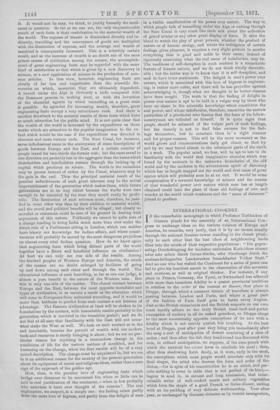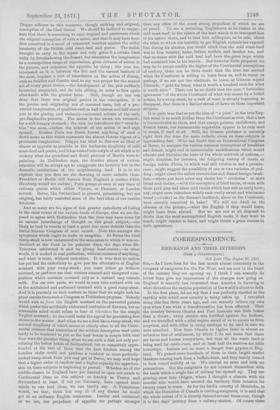INTERNATIONAL COOKERY.
IN the remarkable monograph in which Professor Tiefdenken of Giessen pleads for the assembly of an International Con- gress to exchange ideas on the various cuisines of Europe and America, he remarks, very justly, that it is by no means usually through the national frontier-towns standing iu the closest proxi- mity to each other that the best ideas of neighbouring lands filter into the minds of their respective populations : " Die gegen- seitige Durchdringuug der hoohsten nationalen Koch-ideen nimmt• zwar sehr selten durch Grenz-Stitdte, oder iiberhaupt (lurch die aneinauderliegenden Landstrecken benachbarter Wilkes Statt.' And no one who has visited the Continent for a series of years can fail to give his heartiest assent to the observation of this accurate- and cautious, as well as original thinker. For instance, if any place in France, Germany, the Tyrol, or Switzerland has adhered' with more than tenacious fidelity to a quaint provincial tradition in relation to the order of the courses at dinner, that place is Dieppe, through which a constant stream of travellers is always passing between London and Paris, and where a great part, of the fashion of Paris itself goes to bathe every August. Just as the British steamboats and the British seaports on our own coast loyally adhere to the truly British roast-beef-and-porter conception of cookery in all its naked grandeur, so Dieppe clings to the most eccentrically opposite conceptions of its own with a. fidelity which is not merely quaint, but touching. At the best hotel at Dieppe, year after year they bring you immediately after- the soup a sort of anticipation of dessert consisting of a slice of melon ; and then after the fish they hand round ices flavoured with rum, in refined anticipation, we suppose, of the rum-punch with, which the nautical bon-vivant loves to conclude his meal ; then, after thus shadowing forth dimly, as it were, early in the meal, the conceptions which most people would associate only with its. final stages, the artist who decrees the form and order of the• dishes,—for in spite of his eccentricities he is an artist, and per- mits nothing to come to table that is not perfect of its kind, begins to send in, in earnest and long succession, that inter- minable series of well-cooked meats and solitary vegetables. which form the staple of a good French or Swiss dinner, endiuK with an ice-pudding of very delicate workmanship. Year after- year, as unchanged by German victories as by tourist immigration,
Dieppe adheres to this eccentric, though striking and original, conception of the ideal dinner. We should be inclined to conjec- ture that there is something at once tropical and passionate about the original conception of such a menu, and that it may have been first conceived in a mood of vehement reaction against the wilful insularity of the British cold roast-beef and porter. The melon brought so early in the repast not only gives it a certain ideal unity by foreshadowing the dessert, but stimulates the imagination to a cosmopolitan range of expectation, gives richness of colour to the picture, and enhances the appetite by delay ; the rum ice, interposed as it is between the fish and the earnest business of the meal, imposes a sort of retardation on the action of dining, such as Schiller and Goethe used to say was proper for the second act of every great drama,—the development of the plot suddenly becoming suspended, and its tide ebbing, in order to flow again afterwards with the greater force. Still, though no one can deny that there was original genius in the conception, it is the genius and originality not of matured taste, but of a pro- vincial imagination, of qualities such as half interest and half annoy you in the glaring and violently-contrasted colours of the early pre-Raphaelite pictures. The melon is too sweet, too romantic, for a still hungry stomach ; the rum ice introduces the " retarda- tion" too soon,—before the interest of the action is well-nigh opened. Neither Paris nor Berne knows anything of such a florid menu as this which represents the almost riotous vigour of a provincial imagination. Dieppe has tried to discover an ideal of dinner as opposite as possible to the barbarous simplicity of cold roast-beef and porter, and it has rushed into a style of art which is to cookery what the grandiose and florid pictures of Martin were to painting. As Tiefdenken says, the frontier places of various countries will be always apt to exaggerate the hostility felt to the domestic institutions of the neighbouring land. It is in the capitals that you first see the dawning of more catholic ideas. Frankfort or Berlin will borrow from England a cuisine which Hamburg would not endure Paris grasps at once at any trace of culinary genius which either Vienna, or Florence, or London reveals. Berne, like Switzerland in general, painstaking, but not original, has fairly mastered some of the best ideas of our insular kitchens.
And so many are the signs of this greater catholicity of feeling in the chief towns of the various lands of Europe, that we are dis- posed to agree with Tiefdenken that the time may have come for an earnest interchange of thought on this great subject,—one likely to lead to results at least a great deal more definite than the Social Science Congress of next month. Note this amongst the symptoms which ought to make us sanguine. At Berne the ideal rump-steak is now understood in the same sense in which it was un- derstood at the Cock in its pahniest days, the days when Mr. Tennyson celebrated it and its plump head-waiter ;—in other words, it is cooked in real perfection, without omission of anything, and what is more, without caricature. It is true that no nation has yet had the catholicity to give you the alternative of English mustard with your rump-steak; you must either go without mustard, or perforce use that curious scented and vinegared com- position which contains mustard only as a custard may contain milk. For our own parts, we would as soon take custard with tea as the acidulated and perfumed mustard with a good rump-steak. And it is precisely on such matters as these that we might look for great results from such a Congress as Tiefdenken proposes. Nobody would wish to force the English mustard on the perverted palates which prefer this artificially elaborated confusion of flavours, but no reasonable mind could refuse to hear of toleration for the simple English mustard ; no one could resist the appeal for permitting free choice in the matter. And when we see a dish like a rump-steak, the natural simplicity of which seems so utterly alien to all the Conti- nental cuisines that travesties of the wildest description used quite lately to be tendered to you at the best hotels in simple faith that they were the genuine thing, when we see such a dish not only per- colating the better hotels of Switzerland, but so completely appre- hended at the best of them that the best kitchen among the London clubs could not produce a tenderer or more perfectly- cooked rump-steak than you may get at Berne, we may well hope that a higher order of candour and a higher capacity for apprehen- sion on these subjects is beginning to prevail. Whether we of the middle-classes in England have yet learned to open our minds to Continental ideas on this subject as frankly as France and Switzerland at least, if not yet Germany, have opened their minds to our best ideas, we can hardly say. A Frenchman would, we fear, think but very ill of any dinner he could get at an ordinary English restaurant. Insular and contented as we are, our prejudices of appetite aro perhaps stronger
than any other of the many strong prejudices of which we are so proud. To see a returning Englishmen as he rushes at the cold roast-beef, in the saloon of the boat which is to transport him to his native shore, and to hear him soliloquize, as he eats, about the trials to which his inability to get English victuals has exposed him during his absence, you would think that the cold roast-beef was to him country, home, father, mother, and brother too, and that re-union with the cold beef had been the great hope which had sustained him in his travels. But however little prepared we may be to accept readily the higher of the Continental conceptions of cookery, there can be little doubt that the time has arrived when the Continent is willing to learn from us, and to repay us perhaps, if we are not too obstinate to learn, as Glauous repaid Diomede, " gold for brass, what is worth a hundred oxen for what is worth nine." There can be no doubt that the once " invincible ignorance " of the whole Continent of what was ineaut by a boiled potato, by a rump-steak, by a rack of toast is already beginning to disappear, that there is a distinct streak of dawn on these important subjects.
It is quite true that as yet the idea of " a joint" in the true Eng- lish sense is as much hidden from the Continent as ever, that a tart is inconceivable to them, and that except potatos, cauliflower, and French beans, our innumerable vegetables appear to be only used in soups, if used at all. Still, the Giessen professor is certainly right that the time for more catholic views on these subjects is approaching fast. Who can doubt that an International Congress at Borne, to compare the various national conceptions of breakfast and dinner, might end in innumerable modifications which would educate and liberalize the taste of the whole network of nations,— might diminish, for instance, the fatiguing variety of meats at foreign tables d'hete, in which veal still retains so sad a promin- ence ; might suggest the possibility of one or two varieties of pud- ding ; might cheer the rather resouroeless and dismal foreign break- fast,—where you have never any choice but " cotelettes " or more bread-and-butter,—with the conception of fried bacon, or even with those pork pies and other cold viands which best suit an early hour ; nay, might even introduce widely such really sweet and wholesome bread (not cake) as the Zermatt landlords, alone on the Continent, have recently contrived to bake? We will not dwell on the obverse of the picture,—what the English if they would learn, might learn from abroad. But we are not at all disposed to doubt that the most accomplished English cooks, if they went to teach, might remain to learn, and might obtain a great success in both operations.































 Previous page
Previous page